MBTI® INTJ Electronics Engineers
Strong Interest Inventory® General Occupational Theme Code: Investigative, Realistic (IR) (GOT)
Hammer (1996) writes that Introverted-Intuitive-Thinking-Judging (INTJ) Myers-Briggs Types do best in fields that involve making detailed observations in the present, thinking about them analytically, and using their analysis and conclusions to develop effective real-world changes. MBTI test INTJ’s also tend to do well in relatively high-stress environments. Due to these reasons, among others, INTJ’s can often make ideal electronics engineers.

Image courtesy of hin255 at FreeDigitalPhotos.net
Electronics engineers perform a range of tasks in a variety of sectors, including commercial, military, industrial, and research sectors. Their duties range from as concrete as determining the material or equipment needs of a particular project to as complex and abstract as evaluating the effectiveness or compatibility of projects in reaching certain goals. Electronics engineers may also need to prepare documentation for their products of initiatives for their superiors’ evaluation, determine and implement optimal initiatives or procedures, and direct activities concerned with construction, operation, or maintenance of electronic equipment, products, or systems. In order to do this successfully, they must account for a range of variables, including materials, cost, capacity, systems requirements, resolution, and others, as well as communicate with different individuals or teams, such vendors, clients or customers, other engineers, and management.
Successful electronics engineers must have mastered the use of a variety of hardware and software. The hardware may include counters, multimeters, wattmeters, light absorption meters, and other ways of measuring signal or current strength. They may also need to use various software, such as analytical or scientific software (e.g., Ansoft Simplorer), Development environment software (e.g., Assembler, C), Computer aided design (CAD) software, like Audodesk, and of course various component-oriented development software like C++ and Microsoft Visual Basic. While the exact software and hardware may differ among different companies or organizations, these general categories will be present in most positions.
-
MBTI® Career Report
Price: $62.95 Buy NowDIGITAL DELIVERY
- Receive an in-depth 10-page report on your occupational matches
- Explore your preferred work tasks, environments, and industry matches
- Assessment sent digitally within 2-3 business hours of purchase
In addition to an obvious foundation in mathematics, science, and technology, electronics engineers also need a basic understanding of telecommunications and the English language, to ensure that they can comfortably, fluently, and proficiently communicate with their peers, supervisors, and clients. This relatively broad knowledge base is generally acquired in college, with almost 90% of electronics engineers acquiring an associates or bachelor’s degree, and just a handful having only a high school diploma.
INTJ Myers-Briggs Types are ideal for careers as electronics engineers as it gives them the opportunity to observe and synthesize empirical data to make a measurable difference in the world.
Below are some employment trends for Electronics Engineers:
- Median wage: $50.76 hourly, $105,570 annually
- Employment: 138,500 employees
- Projected growth (2018-2028): Little or no change (-1% to 1%)
- Projected job openings (2018-2028): 9,000
Visit Our MBTI® About Page and Our INTJ Personality Type Page For Detailed Information on The INTJ Personality Type
Visit Our Strong Interest Inventory® Resource Page To Learn About The (IR) GOT
Click on one of these corresponding popular INTJ Careers for detailed information including Career Stats, Income Stats, Daily Tasks and Required Education: Anesthesiologist, Electronics Engineers, Biochemist, Industrial Engineers, Biologist, Information Security Analysts, Chemical Engineers, Lawyer, Computer Programmer, Surgeon.
Explore Our INTJ Blog Pages
Explore additional information that delves deeper into the INTJ Personality Type by examining various personality and career based subjects:
- How the MBTI INTJ Type relates to Innovation
- How the MBTI INTJ Type relates to Project Management
- How the MBTI INTJ Type relates to Emotional Intelligence
- How the MBTI INTJ Type relates to Leadership
- How the MBTI INTJ Type Communicates
Click on a link below to read more about different MBTI Personality Types
| ISTJ | ISFJ | INFJ | INTJ | ESTP | ESFP | ENFP | ENTP |
| ISTP | ISFP | INFP | INTP | ESTJ | ESFJ | ENFJ | ENTJ |
References
Bureau of Labor Statistics wage data and 2012-2022 employment projections Onetonline.org
MBTI® Type Tables for Occupations, 2nd Edition. Schaubhut, N. & Thompson, R. (CPP, 2008)
Introduction To Type and Careers, Hammer, A. (CPP, 1996)

